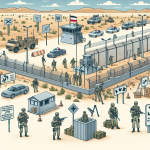Sudan Faces Food Crisis Amid Rainy Season and Funding Shortfalls
Sudan Faces Food Crisis Amid Rainy Season and Funding Shortfalls
Overview of the Crisis
Sudan is grappling with a severe food crisis exacerbated by the ongoing rainy season and significant funding shortfalls. The situation has left millions of people in dire need of assistance, with the country’s most vulnerable populations bearing the brunt of the crisis.
Key Challenges
- Adverse Weather Conditions: The rainy season has led to widespread flooding, damaging crops and infrastructure, and disrupting food supply chains.
- Funding Deficits: Humanitarian organizations are facing critical funding gaps, limiting their ability to provide necessary aid and support to affected communities.
- Economic Instability: Sudan’s ongoing economic challenges, including inflation and currency devaluation, have further compounded the food crisis.
Impact on the Population
The food crisis has had a profound impact on Sudan’s population, particularly in rural areas where access to food and resources is already limited. Key impacts include:
- Increased Malnutrition: Rising food insecurity has led to higher rates of malnutrition, especially among children and pregnant women.
- Displacement: Flooding and food shortages have forced many families to leave their homes in search of sustenance and safety.
- Health Risks: The combination of malnutrition and displacement has heightened health risks, with limited access to medical care exacerbating the situation.
Efforts to Mitigate the Crisis
Despite the challenges, efforts are underway to address the food crisis in Sudan. These include:
- International Aid: Humanitarian organizations are working to secure additional funding and resources to support relief efforts.
- Local Initiatives: Community-based programs are being implemented to improve food security and resilience among affected populations.
- Government Support: The Sudanese government is collaborating with international partners to develop long-term strategies for food security and economic stability.
Conclusion
Sudan’s food crisis is a multifaceted challenge driven by adverse weather, economic instability, and funding shortfalls. While efforts are being made to address the immediate needs of affected populations, long-term solutions are essential to ensure food security and stability in the region. The international community’s support and collaboration with local initiatives will be crucial in mitigating the impact of this crisis.














